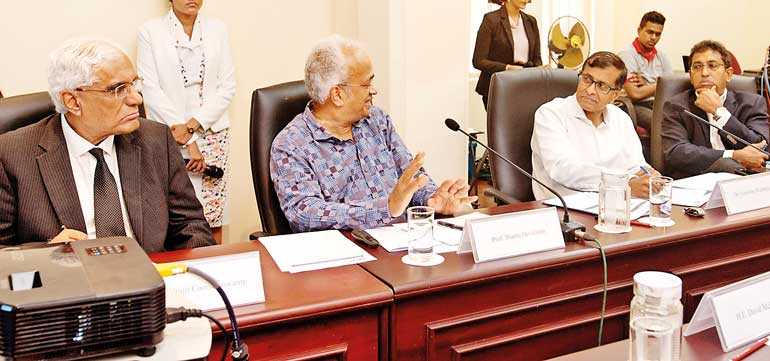Saturday Feb 14, 2026
Saturday Feb 14, 2026
Monday, 12 August 2019 22:33 - - {{hitsCtrl.values.hits}}

From left: Central Bank Governor Dr. Indrajit Coomaraswamy; Dr. Shanta Devarajan, Professor of Practice at Georgetown University’s Walsh School of Foreign Service, Washington DC; LKI Executive Director Dr. Ganeshan Wignaraja; and Non-Cabinet Minister of Economic Reforms and Public Distribution Dr. Harsha De Silva
Globalisation is facing a growing backlash around the world. The rapid growth in trade, financial and labour flows over recent decades has been blamed for many of the world’s most pressing problems, including growing inequality.
But the empirical evidence on the impacts of globalisation is mixed. Some countries have seen an acceleration in economic growth and significant reductions in poverty as a result of liberalisation, while others have seen little acceleration in growth, and in some cases even seen a slowdown.
One reason for this may be that, in many countries, the forces of globalisation have only reached tradable sectors, such as manufacturing. Non-tradable sectors, primarily services, remain dominated by monopolies. The resulting high costs for inputs such as electricity and logistical services has reduced the competitiveness of exports and, therefore, undermined the potential benefits of globalisation.
As such, the mixed record of globalisation, may not because it has gone too far, but rather that it hasn’t gone far enough to promote competition in the non-tradable sectors.
Dr. Shanta Devarajan, Professor of Practice at Georgetown University’s Walsh School of Foreign Service, Washington DC, expressed these views at an LKI Foreign Policy Round entitled ‘Has Globalisation Gone Too Far—or Not Far Enough?’ held on 6 August at the Lakshman Kadirgamar Institute of International Relations and Strategic Studies (LKI). Dr. Devarajan recently retired as Senior Director for Development Economics at the World Bank after a long and distinguished career.
The event was supported by The Asia Foundation, and drew a diverse group of participants including Non-Cabinet Minister of Economic Reforms and Public Distribution Dr. Harsha De Silva, Central Bank Governor Dr. Indrajit Coomaraswamy; LKI Board members, senior members of the diplomatic corps, academics, Government officials, and representatives of the media, think tanks and the private sector.
Dr. Devarajan’s presentation was followed by a discussion moderated by LKI Executive Director Dr. Ganeshan Wignaraja.
Sri Lanka’s recent attainment of upper-middle income status after over 40 years of globalisation and reforms is seen as an important development achievement. Furthermore, it was highlighted that, while several services sectors in Sri Lanka, like telecoms, are already relatively open to competition, some are not. However, the discussion also noted that reforms to these sectors should be part of a coherent national recovery program to ensure that businesses can retain their competitiveness and minimise job losses.
Investments in education and infrastructure, as well as anti-corruption measures, are other key elements of such a national program. The escalating trade tensions between China and the US were also explored which indicated possible export opportunities for countries like Sri Lanka arising from trade diversion through higher import tariffs.
LKI is a think-tank that analyses Sri Lanka’s international relations and strategic interests, to provide insights and recommendations that advance justice, peace, prosperity, and sustainability. The Institute reflects the vision of the late Lakshman Kadirgamar by promoting the country’s intellectual profile in foreign policy research and engagement.
Being present in public debates is a cornerstone of LKI’s strategy, and the Institute accomplishes this via its policy dialogues which convene a diverse range of local and international speakers.